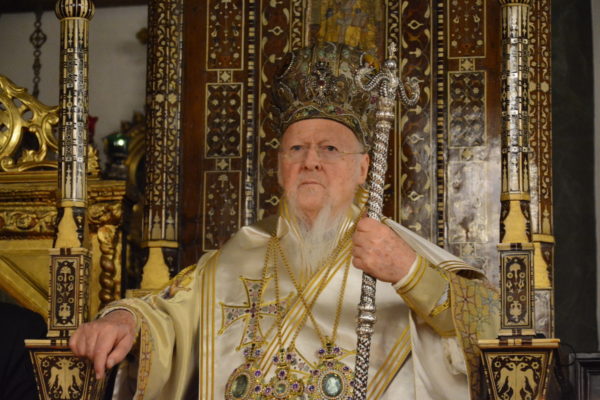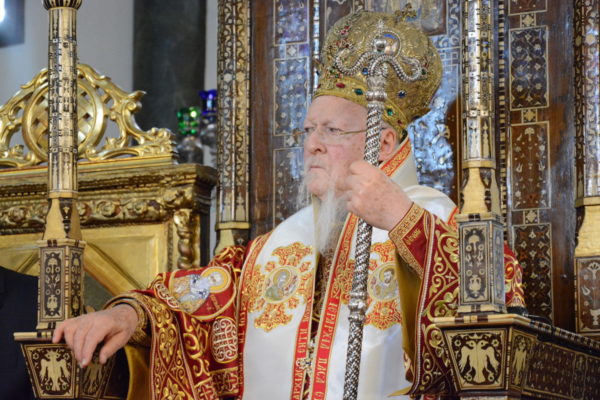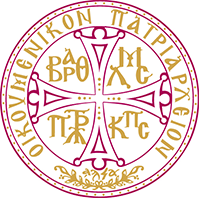Our Beloved Brother in the Lord,
Archbishop Spyridon of America,
Beloved Brother Bishops in the Lord,
Beloved Friends,
We greet you, secure in the love of Jesus Christ and in His blessed commandment to love one another. This commandment is at the heart of our desire to be here with you today. We are honored by the presence of representatives from Des Moines’ various faith-traditions. We thank the Diocese of Chicago and the community of St. George for organizing this gathering. We are honored to be here, as are the representatives of the Great Church of Christ. How good it is for brothers to dwell together in praise of God’s majesty and sovereignty over all creation.
We come to this great nation, the 270th successor of Saint Andrew the First Called Apostle of Jesus Christ, to celebrate the seventy-fifth anniversary of the Greek Orthodox Archdiocese of America. Having flourished in the rich diversity and principled freedom of American society, we are moved reiterate our commitment to peace and tolerance among all people and all nations of the world. We are opposed to all violence, discrimination, violation of human rights and religious persecution that isolates one person from the other.
The United States has demonstrated time and again its unwavering commitment to the fundamental rights of the individual. These rights, especially the right to worship in free expression of one’s beliefs, are completely consistent with Orthodox creation theology. Every human being, created in the image and likeness of God, has the free will to chose to follow God’s will. In this way, God is made manifest in the world. The secular society’s guarantee of that right is a point where the worldly and the Divine have a visible, common intersection of mutual interest.
However, we are also aware, that no one lives in radical separation from their community. Even the most ascetic of monks renounce the world in order to pray for all who are in it. Even though they are martyrs on behalf of humanity, they are connected by love to their brothers and sisters. The individual possesses free will, but exercises that will in a constant relationship to his spiritual siblings, and in relation to the environment in which he lives. Thus, individuals are interdependent as well.
As Ecumenical Patriarch and in the context of Orthodox Christian theology, we would also like to reiterate our concern for the ecological welfare of our planet, for our own well-being, and for that of future generations. All faith traditions have a moral and ethical responsibility in preserving the environment. The relationship between the Creator and the created is at the heart of all religious enterprise.
The individual’s free will must be understood as being responsible to the moral and ethical commandments inherent in his understanding of his relationship to God. Thus, no matter what faith tradition instills purpose in his life, the individual understands his success at realizing his own freedom in relationship to something outside himself.
While we shall have more to say about this during our visit to the West Coast, we wish to reaffirm our universal concern for the environment as part of God’s ongoing relationship with humanity. We see this as a fundamental issue within the broader Ecumenical and Interfaith dialogue.
The Ecumenical Patriarchate has been at the forefront of the dialogue with Christian Churches, as well as other religions. We are committed to taking an active role in world bodies which foster religious tolerance, freedom and liberty. A just society is an example of God’s will at work in mankind.
We believe that when people begin to practice their religion with sincerity and depth, that peace and goodwill shall prevail in the world. Orthodox theology does not divide the holy and the profane, the spiritual and the worldly. When God became man, he united the divine and the human, the spiritual and the material. We believe that the world and mankind is being transfigured by God’s love.
Today, more than ever, our personal existence and values must be anchored in an understanding of God. The message we bring to you today, to this great state and this great nation, is that religion has the responsibility and obligation to guide persons toward God, that they might seek His justice in love.
We are committed to the Ecumenical and Interfaith dialogue as a means of knowing one another in fullness and truth. Wherever we may proclaim our unity in common cause for the dignity of humanity, there we have fulfilled the high ideals of Ecumenism, and the commandment of Christ to “love one another.”
May Des Moines’ diversity continue to be an icon of the best of American religious diversity, knowing our similarities in love and seeking peace in loving acceptance of our differences.
May the Lord grant us all health and enlightenment. Thank you.





